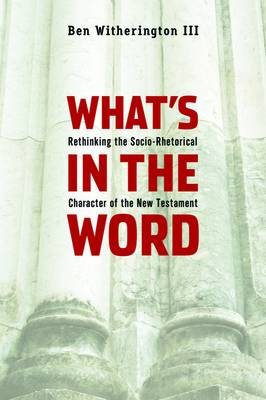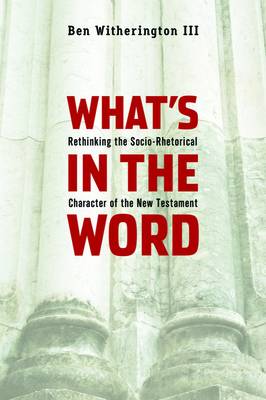
- Retrait gratuit dans votre magasin Club
- 7.000.000 titres dans notre catalogue
- Payer en toute sécurité
- Toujours un magasin près de chez vous
- Retrait gratuit dans votre magasin Club
- 7.000.0000 titres dans notre catalogue
- Payer en toute sécurité
- Toujours un magasin près de chez vous
What's in the Word
Rethinking the Socio-Rhetorical Character of the New Testament
Ben WitheringtonDescription
Written in clear, and at times colorful, prose, Ben Witherington's What's in the Word explains how the recognition of the oral and socio-rhetorical character of the New Testament and its environment necessitates a change in how the New Testament literature is read. Expanding on the work in which he has been fruitfully engaged for over a quarter century, Witherington challenges the previously assured results of historical criticism and demonstrates chapter by chapter how the socio-rhetorical study shifts the paradigm.
Taken together, the chapters in What's in the Word coalesce around three of Witherington's ongoing academic concerns: orality and rhetoric; New Testament history, including issues of authenticity and canonicity; and the exegesis of given words in their canonical and socio-cultural contexts. Always unpredictable, this book never fails to pique interest and proffer instruction.
Spécifications
Parties prenantes
- Auteur(s) :
- Editeur:
Contenu
- Nombre de pages :
- 203
- Langue:
- Anglais
Caractéristiques
- EAN:
- 9781602581968
- Date de parution :
- 01-08-09
- Format:
- Livre broché
- Format numérique:
- Trade paperback (VS)
- Dimensions :
- 154 mm x 230 mm
- Poids :
- 353 g

Les avis
Nous publions uniquement les avis qui respectent les conditions requises. Consultez nos conditions pour les avis.






